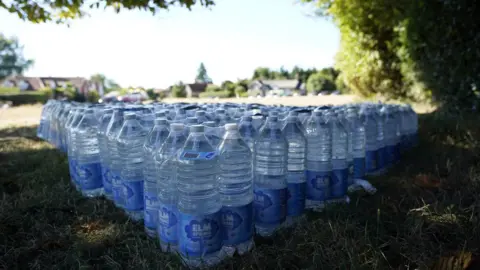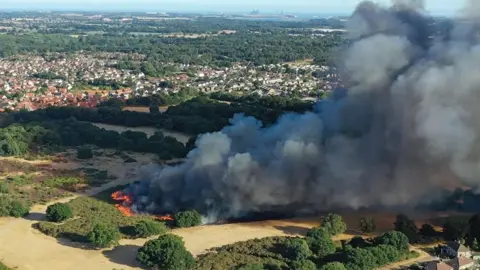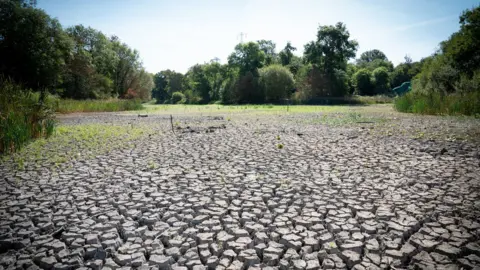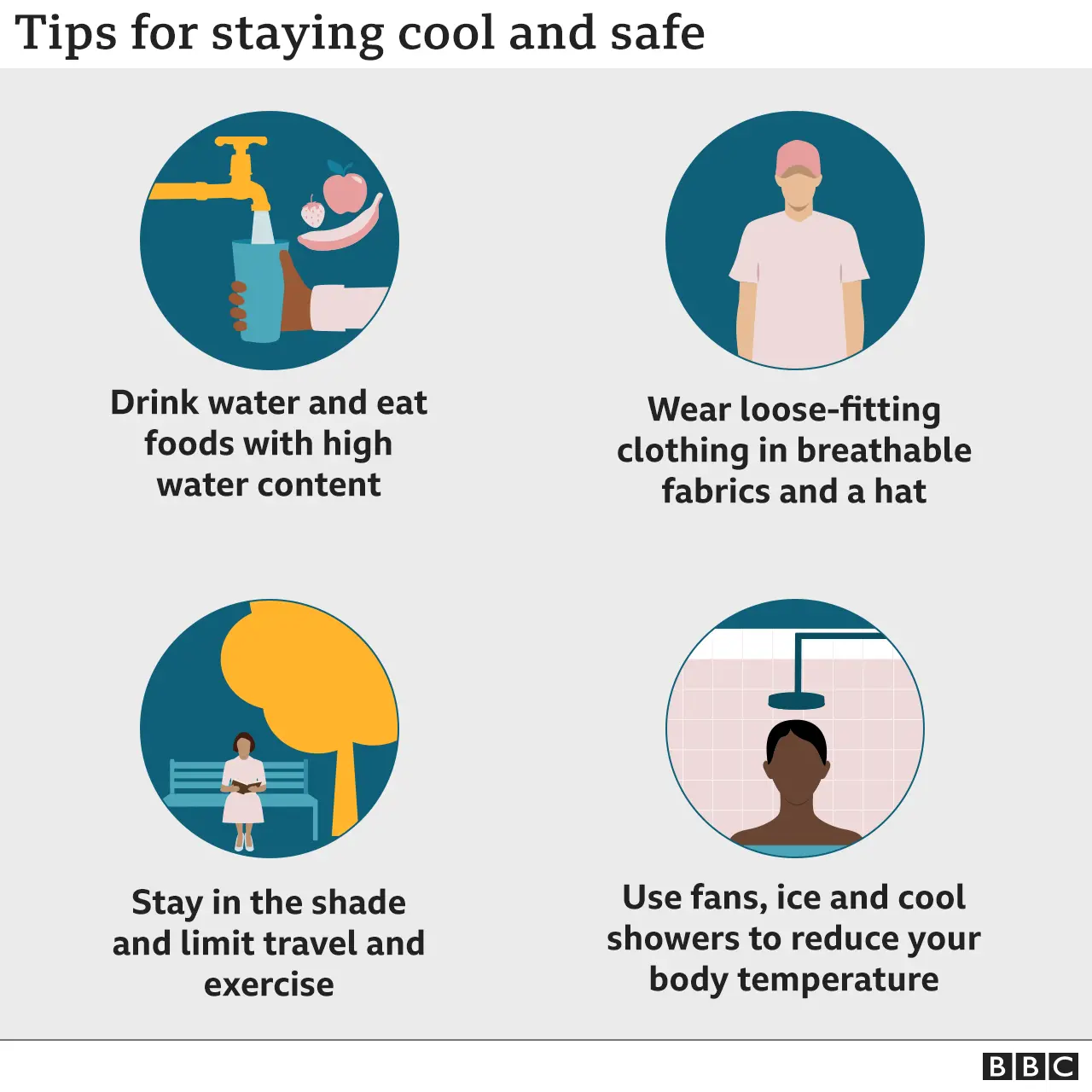UK heatwave: Four-day extreme heat warning for parts of UK
 EPA
EPAThe Met Office has issued a four-day amber extreme heat warning, meaning vulnerable people's health could be impacted and travel could be disrupted.
The warning applies to southern and central England and parts of Wales from midnight on Thursday until Sunday.
Temperatures are set to reach up to 35C (95F) in some areas and Thames Water has become the latest water firm to announce hosepipe ban plans.
Meanwhile, a 14-year-old boy has died in a lake in Hertfordshire.
Emergency services were called to North Met Lake, off Cadmore Lane in Cheshunt, just after 17:00 BST on Monday, with his body recovered six hours later, Hertfordshire Constabulary said.
A second search is under way for a man in his early 20s who has gone missing in a lake in Hounslow, west London, the Metropolitan Police confirmed.

The amber alert is the longest the Met Office has issued since it introduced the warning system in 2021 and is lower than the first-ever red warning in July, when temperatures exceeded 40C for the first time.
But the Met Office said while temperatures this week would remain below last month's record highs, this heatwave could last longer.
The Met Office warning is one of several alerts aimed at preparing the country for the heat:
- A level-three heat-health alert will apply from Tuesday to Sunday in central and southern England, the UK Health Security Agency (UKHSA) said. This "requires social and healthcare services to target specific actions at high-risk groups"
- A level-two alert has been issued for northern England
- The Met Office's fire severity index is "very high" for most of England and Wales and will reach "exceptional" for parts of England by the weekend. This assesses how severe a fire could become if one starts
While the warnings remain lower than those issued during last month's record temperatures, the UKHSA's Dr Agostinho Sousa emphasised it was important vulnerable people, like the elderly who live alone or anyone with underlying health conditions, were "prepared for coping during the hot weather".
"The most important advice is to ensure they stay hydrated, keep cool and take steps to prevent their homes from overheating," he added.
Disabled people could be particularly affected by heat, and may suffer fatigue, difficulty regulating their body temperatures, or problems moving to cooler spots in the home, Fazilet Hadi, from Disability Rights UK, said.
Meanwhile, a dairy farmer in Shropshire has said he might have to send some of his cows to slaughter if there is no rain in August as a result of the reduced amount of grass available.
The amber warning for extreme heat comes as Thames Water has had to provide bottled water to residents in the village of Northend in Oxfordshire.
The water company said supplies were disrupted due to a technical issue, later adding that customers should now have water, but the pressure could be lower than normal.
One farmer told the BBC the situation had become "dire" - explaining that he had almost considered filling up cattle troughs with bottled water.
Another Northend resident said they had not been able to shower, flush the toilet or prepare food - apart from when using bottled water.
 PA Media
PA MediaEngland had its driest July this year since 1935, according to the Met Office, while south-east and central southern England had the driest month since records began in 1836.
Between the start of this year and 6 August, the south-east recorded 144 days with average rainfall of less than 0.5mm. Of those, 57 saw no rain at all.
Cathryn Ross from Thames Water said the water company was "seeing unprecedentedly low storage" and this summer saw "less than 65% of rainfall" than expected.
"We're looking at less than 75% of our storage at the moment as to where we would expect it to be.
She said Thames Water was planning ahead for hotter, drier summers by becoming more water efficient, increasing storage and "potentially" new reservoirs.
Meanwhile, a disabled man from Llandysul, Wales says he has been struggling in the heat with no water or low water pressure for three weeks.
Data from the Environment Agency has shown River Wye levels are now as low as 2cm and water temperatures are expected to rise in coming days.
Warnings of the threat posed by wildfires have been issued, with fire services urging people not to light bonfires or barbecues, or let off fireworks or sky lanterns.
On Tuesday, around 70 firefighters battled a blaze over five hectares (12.36 acres) of grass and shrubland in Enfield, north London, while there were also fires on the outskirts of Ipswich, in Northamptonshire and near Reading.
 Sky Cam East/PA Media
Sky Cam East/PA MediaThe heatwave combined with months of dry weather have also led to increasing problems for farmers, with grass not growing and irrigation water running low cited as two key concerns.
Thames Water said it would be announcing restrictions on water use in response to forecasts of more hot and dry weather, with the exact timings to be confirmed later.
Hosepipe bans are already in force in Hampshire and on the Isle of Wight, and others are due to come into force in Kent, Sussex, Pembrokeshire, and Carmarthenshire.
The UK Centre for Ecology and Hydrology has warned river flows are set to remain exceptionally low in central, southern and eastern England until October.
River Action founder Charles Watson called for the government to act to prevent an "ecological emergency", warning that if river flows slowed down the ecology of rivers could be killed and the concentration of pollution in them would increase.
Christine Farnish, a former board member of water regulator Ofwat, told BBC Radio 4's PM programme water companies "need to get their houses in order" over leakage and said they had been "very slow" to wake up to the realities of climate change.
But Water UK's director of policy Stuart Colville said Ofwat figures showed companies were at the lowest ever levels of leakage on record and said the industry was doing "everything we can" to avoid restrictions on water use.
The National Trust has warned that bats, lichen and stately gardens have been hit hard by the hot summer weather, with its climate change adviser describing the impact as "stark".
Concerns have also been raised by the River Tweed Commission about the impact of low water levels and high temperatures on Atlantic salmon, sea and brown trout.
Met Office deputy chief meteorologist Dan Rudman said temperatures would be "rising day-on-day through this week" and were expected to peak at 35C on Friday and Saturday in some areas.
Any showers would be to the far north-west of the UK and would be short-lived in nature, he said, adding there would be "no relief for parched land" in the south.
 PA Media
PA MediaA heatwave is defined as above average temperatures being reached for three days or more. Heatwaves are becoming more likely and more extreme because of human-induced climate change.
The world has already warmed by about 1.1C since the industrial era began, and temperatures will keep rising unless governments around the world make steep cuts to emissions.
We are living in the hottest period for 125,000 years, according to the UN's climate science body, the Intergovernmental Panel on Climate Change.


How is the hot weather affecting you? Share your experiences by emailing [email protected].
Please include a contact number if you are willing to speak to a BBC journalist. You can also get in touch in the following ways:
- WhatsApp: +44 7756 165803
- Tweet: @BBC_HaveYourSay
- Upload pictures or video
- Please read our terms & conditions and privacy policy
If you are reading this page and can't see the form you will need to visit the mobile version of the BBC website to submit your question or comment or you can email us at [email protected]. Please include your name, age and location with any submission.


- A CULTURE OF FEAR?: A closer look at £2bn 'punk' brewery business BrewDog
- FROM BOY TO MAN TO PRIME MINISTER: The story of Boris Johnson as told by those who know him best

